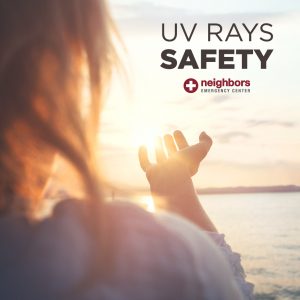
Summer is when we spend more time outdoors, mostly for family gatherings and recreational sports. But some people are outdoors in search of a deep sun tan. Those damaging amounts of Ultraviolet rays on skin can cause not only a sunburn, but long term damage to skin that can also lead to skin cancer.
Exposure to UV radiation is the main factor that causes skin cells to become cancer cells. Almost all skin cancers are caused by too much UV radiation from the sun.
Skin cancer develops in the epidermis cells, the top layer of the skin, when the body is unable to repair this damage. The cell can begin to divide and grow in an uncontrolled way. This growth can eventually form a tumor.
Neighbors Emergency Center is dedicated to your well-being. If you have to be outside, there are a broad spectrum of sunscreens and preventative measures to let you enjoy summer in a sun smart way.
Sunscreen
• Use sunscreen. This is the best way to protect your skin if you will be outside in direct sunlight for any extended period of time.
• 20 minute rule. Coat all exposed areas of skin with sunscreen at least 20 minutes before you head outside. This gives the sunscreen time to start protecting your skin before the first ray of light hits it.
• Be generous. It is estimated that seven teaspoons of sunscreen (one teaspoon per area) are needed to coat both arms, legs, torso, back and your face and neck before sun exposure starts.
• Reapply often. Put more sunscreen on after two hours if you will be swimming, sweating or toweling off.
Choose the right sunscreen
• Choose a “broad-spectrum” protection. Sunscreens with this label protect against both UVA and UVB rays. All sunscreen products protect against UVB rays, which are the main cause of sunburn. But UVA rays also contribute to skin cancer and premature aging.
• Choose a sunscreen with a sun protection factor (SPF) of 30 or higher. The SPF number is the level of protection the sunscreen provides against UVB rays. Higher SPF numbers mean more protection. SPF 15 filters out about 93% of UVB rays; SPF 30 filters out about 97%; SPF 50 filters about 98%, and SPF 100 filters about 99%. No sunscreen protects you completely.
• “Water resistant” does not mean “waterproof.” No sunscreens are waterproof or “sweatproof”. If a product’s front label makes claims of being water resistant, it must specify whether it lasts for 40 minutes or 80 minutes while swimming or sweating.
Cover up
• Wear pants and long sleeve shirts. Shirts with collars provide the best protection.
• Hats are necessary. The most sensitive skin is on your face and neck. Wide brim hats work the best; a brim all the way around the hat helps protect your nose, eyes, cheeks, ears and neck.
• Protect your eyes. Wear sunglasses that have 100% UVA and UVB protection. The tighter they fit and the more they wrap around the sides of your eyes, the better. Sunglasses also help protect the sensitive skin around your eyes and can help prevent wrinkles and crow’s feet.
It’s good to love the sun. But love your skin more. It will thank you for it and give you years of protection into the future.

